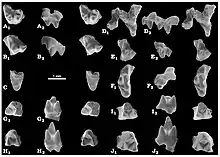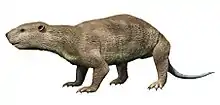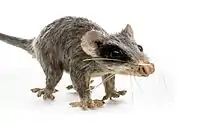Pappotherium
Pappotherium is an extinct genus of mammals from the Albian (early Cretaceous) of Texas, US, known from a fossilized maxilla fragment bearing two tribosphenic molars, discovered within the Glen Rose Formation near Decatur, Wise County, Texas.
| Pappotherium Temporal range: | |
|---|---|
 | |
| Scientific classification | |
| Domain: | Eukaryota |
| Kingdom: | Animalia |
| Phylum: | Chordata |
| Class: | Mammalia |
| Family: | †Pappotheriidae Slaughter, 1965 |
| Genus: | †Pappotherium Slaughter, 1965 |
| Species[1] | |
|
P. pattersoni Slaughter, 1965 | |
| Synonyms | |
|
Slaughteria Butler, 1978 | |
The fossil was discovered by Bob H. Slaughter within some deposits dating back to 112.6 – 109 million years ago.[1] On the basis of the morphology of the molars' cusps, in 1965 Slaughter established the new genus Pappotherium and the new species P. pattersoni; he also created an apposite family, Pappotheriidae. Both this family and the genus are nowadays still monotypic.
Slaughter argued that Pappotherium should have been a basal form close to the metatherian-eutherian divergence point; this mammal likely was an arboreal insectivore.[1]
Etymologically speaking, the name Pappotherium is a compound of the Latin words pappus (from ancient Greek πάππος, páppos, “grandfather”) and therium (from ancient Greek θηρίον, thēríon, “beast”, a common suffix among extinct mammals), with the full meaning of “mammal-grandfather”.
The second part of the unique species' name, pattersoni, was instead chosen in honor of the American paleontologist Bryan Patterson.
More recently, it has been recovered as a possible deltatheroidean.[2][3][4] The most recent phylogeny including Pappotherium is reproduced below.[4]
| Metatheria |
| ||||||||||||||||||||||||||||||||||||||||||||||||||||||
References
- Pappotherium on Fossilworks.org
- Guillermo W. Rougier; Brian M. Davis; Michael J. Novacek (2015). "A deltatheroidan mammal from the Upper Cretaceous Baynshiree Formation, eastern Mongolia". Cretaceous Research. 52, Part A: 167–177. doi:10.1016/j.cretres.2014.09.009.
- S. Bi, X. Jin, S. Li and T. Du. 2015. A new Cretaceous metatherian mammal from Henan, China. PeerJ 3:e896
- Wilson, G.P.; Ekdale, E.G.; Hoganson, J.W.; Calede, J.J.; Linden, A.V. (2016). "A large carnivorous mammal from the Late Cretaceous and the North American origin of marsupials". Nature Communications. 7: 13734. Bibcode:2016NatCo...713734W. doi:10.1038/ncomms13734. PMC 5155139. PMID 27929063.
Bibliography
- Slaughter, B. H. 1965, "A therian from the lower Cretaceous (Albian) of Texas", Postilla 93, Peabody Museum of Natural History, Yale University, pp. 1–18.
- Davis, B. M. & Cifelli, R. L. 2011, "Reappraisal of the tribosphenidan mammals from the Trinity Group (Aptian–Albian) of Texas and Oklahoma", Acta Palaeontologica Polonica 56 (3), pp. 441–62.



